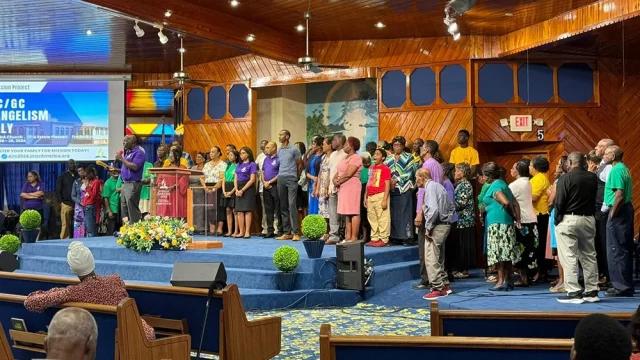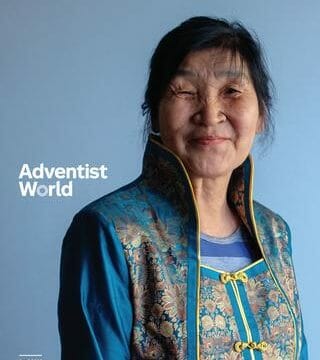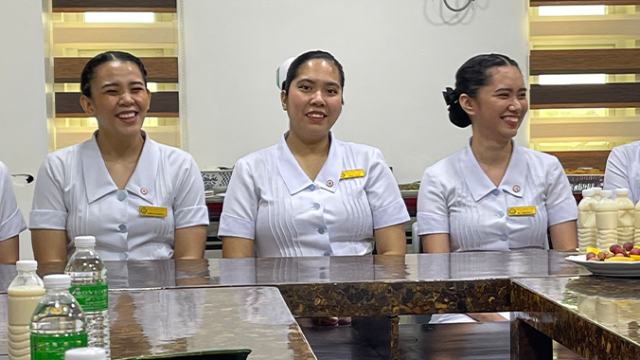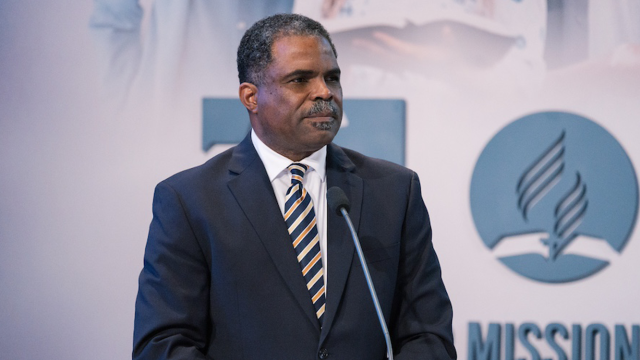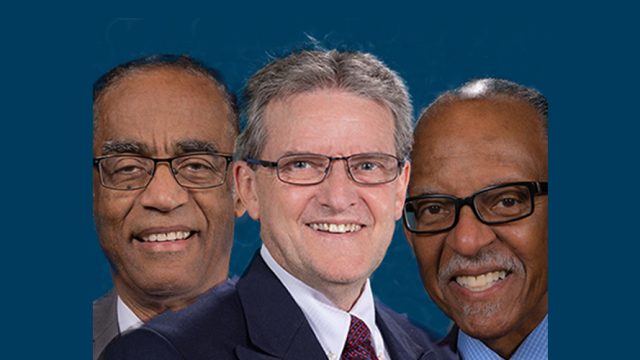September event coincided with the arrival of Hurricane Francine.

After a year of planning, the 2024 North American Division (NAD) enditnow Safeguarding Peace training on abuse prevention and response, set to take place in New Orleans, Louisiana, United States, almost did not happen. Hurricane Francine, a Category 2 storm predicted to hit Southern Louisiana on Wednesday, September 11 — the event’s opening night — threatened to shut everything down. However, after much prayer and consideration, organizer Erica Smith, assistant director of NAD Women’s Ministries, and the enditnow team decided to proceed.
On the 11th, as Francine hit, 54 of the 181 registered attendees sheltered from the heavy winds and rain in a cozy hotel conference room. The group included conference administrators, finance and human resources professionals, women’s and children’s ministry directors, pastors, teachers, and local church leaders from Canada, the U.S., Colombia, and Puerto Rico. Twenty percent of participants were men. Ten participants from the recent Adventist Risk Management conference, held at the same site, also attended due to travel delays.
“Satan had some plans, but God’s plans were bigger and greater,” Smith said in her introduction.
From September 11-13, participants were empowered to tackle abuse through devotionals, presentations, and vivid accounts from victim-survivors — all Adventist church members, followed by group discussions. A video testimony detailing one woman’s horrific experience of emotional, physical, and sexual abuse by her husband, illustrated the stark reality of abuse but concluded with a message of hope. “Whatever the reason [I was abused], God brought me through it. And if it’s to tell my story, that’s what I’ll do.”
Daily Highlights
Presenters included Smith and Rene Drumm, senior research professor of sociology at Andrews University and a key contributor to the Safeguarding Peace manual. Other speakers included Stanley Stephenson, a licensed therapist and Drumm’s husband; Doug Tilstra, retired vice president for student life at Walla Walla University; and Nicole Parker, author, therapist, and adjunct professor at Southern Adventist University. Tracy Ray, executive director of Safe Haven of Pender, could not attend due to the storm.
In the opening devotional, David Fournier, vice president and chief client care officer at Adventist Risk Management, highlighted believers’ call to accountability, based on Matthew 25:36-41. On judgment day, he said, “caring for the needy and vulnerable among Jesus’ disciples [will be] the clinching evidence of kingdom life.”
Wednesday’s sessions debunked myths and provided facts about intimate partner violence and definitions of abuse: emotional, physical, sexual, spiritual, and stalking. Attendees learned that in the U.S., more than 10 million adults experience domestic violence annually. Additionally, one in four women and one in nine men experience severe sexual or physical violence and/or intimate partner stalking, resulting in health impacts.
A survey-based study of 1,400 church members found that more than 60 percent of the sample had experienced some form of emotional or psychological abuse. Thirty percent of women and 20 percent of men also reported physical violence. Drumm concluded that abuse is as pervasive in the church as in society, and “anyone can be an abuser.”
Tilstra shared that “one of the best ways to help individuals in a domestic violence situation is through the local church,” making enditnow training crucial.
On Thursday, presenters discussed the barriers victim-survivors face in seeking safety, including religious and cultural factors, emotional dynamics, and situational considerations. They covered signs of abuse, red flags, and holistic health impacts. Notably, in the U.S., three women are killed by an intimate partner every day, and victims experience increased depression, post-traumatic stress disorder (PTSD), and suicidal thoughts.
Another segment covered assessment, response, and prevention. Speaking on a handout on prevention, Tilstra said, “This is a roadmap that can take you a long way in one year.”
Attendees role-played as victims or advocates. They rehearsed the three keys to a disclosure response — believe the individual, grieve that person’s pain, and relieve the situation by offering resources and support. They also learned to assess safety on a scale of one to three and connect individuals to domestic violence teams or emergency services as needed. Another meaningful activity involved researching local resources.
Presenters also covered child abuse on Thursday. “A safe childhood is an adult responsibility,” Smith had attendees repeat aloud.
NAD general counsel Robert Burrow underscored that “anyone who works with children, even in a broad sense, is a mandated reporter.”
enditnow Advocates
Participants were continually challenged to be part of the solution rather than waiting for church policy to combat abuse. Several attendees were victim-survivors who felt compelled to help others facing challenges they had overcome.
One such attendee, Janice MacDonell, learned about the enditnow training from Smith at the Ontario Conference Ministries Conference in March 2024. She suffered physical and emotional abuse from a former boyfriend and now anticipates ministering to other abuse victims through equine therapy. “Every step is part of the journey, and attending this training is leading me in that direction,” she said.
Ruth Shaw, who also experienced domestic violence, said, “This training will help me be confident in helping somebody else who might be experiencing [or be in danger of] abuse.”
In the final devotional, Parker shared that, at age 15, having experienced childhood abuse, she was suicidal, asking, “If God is strong enough to protect me and loves me infinitely, why did He let this happen?” She returned to her faith the following year and now advocates for other victims as an educator, therapist, and author of the Tales of the Exodus series, which tells the stories of biblical characters who, like her, “suffered abuse and came out on the other side with greater faith.”
Parker challenged attendees to “seek justice . . . and fight in God’s army, whether you win or lose.” She expressed excitement “that the NAD is taking these steps to help people.”
She was heartened to see leaders like Haskell Williams, Carolina Conference Ministerial Association director, offering support. As Thursday’s devotional speaker, Williams spoke on abuse throughout history. “Satan was the first abuser, infecting our first parents with selfishness.”
Williams shared that he and his daughter, Kirsten, were compelled to attend after experiencing an abbreviated version of the training at the 2024 Carolina Camp Meeting. “I feel equipped to connect with others who are helping those suffering from Intimate Partner Violence [IPV]. We’ve already begun making connections in our community,” he said.
In a fitting culmination of the training, for the first time, 100 percent of the participants passed the required assessments to be certified as enditnow advocates. They readily accepted the responsibility of serving as first responders and educators on issues of abuse in their churches and communities.
According to the Safeguarding Peace manual, their responsibilities include volunteering as anti-abuse advocates to be primary contacts for disseminating abuse prevention information; connecting with local or state domestic violence providers for training; following up with enditnow organizers; and ensuring that their local church holds an enditnow emphasis day in August.
On Thursday, Smith concluded with a quote from Ellen G. White’s Patriarchs and Prophets, which sums up why Smith and the enditnow team continue to host these trainings. “A disposition to cause pain, whether to our fellow men or the brute creation, is satanic. . . . a record goes up to heaven, and a day is coming when judgment will be pronounced against those who abuse God’s creatures” (p. 443).
The original version of this story was posted on the North American Division news site.






